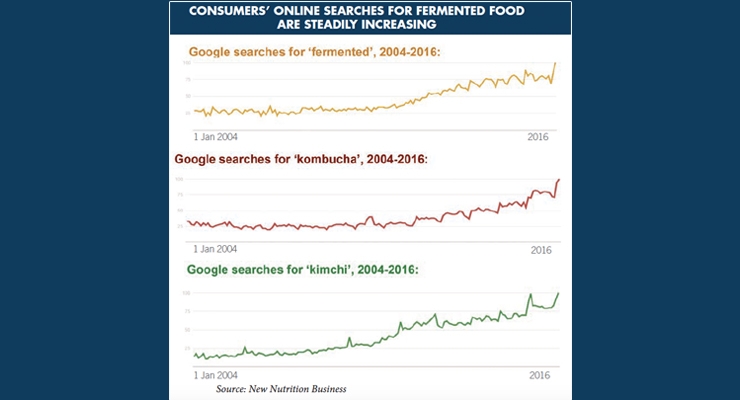Market Updates
Fermented Foods Opportunity Continues to Ripen
Smart companies should capitalize on the fermentation trend now, according to New Nutrition Business.
By: Sean Moloughney

When PepsiCo, the world’s second-biggest food and beverage company, bought small fermented drinks maker KeVita in late 2016, it sent a clear sign that fermented foods have reached a tipping point.
“Social media is buzzing about fermented foods,” said Julian Mellentin, author of New Nutrition Business’ new report Fermentation: how to make a trend into an opportunity. “The restless, food-explorer consumer can find a wealth of bloggers and online sources recommending kombucha and other fermented teas, sauerkraut, kefir, kimchi, pickles, vinegars, tempeh and a host of other fermented foods for their digestive health benefit. Against this tide of more interesting alternatives, yogurt looks like a less exciting option.”
Against 0.5% growth for the $6.9 billion U.S. spoonable yogurt market in 2016 (IRI), kefir experienced 16% sales growth, for the third year in a row. Vinegars, a $544 million market, grew 11.7%, with an average annual growth rate of 9% in the past three years, and kombucha, now a big and established business, grew by 7%.
Smart companies will seize the fermentation opportunity now, at Day One, said Mr. Mellentin. “It’s a good time to take a calculated risk on a development that links to some powerful growth trends.”
Digestive wellness, the strongest and longest-lasting trend, is key to the success of fermentation. Consumers need to “feel comfortable inside” and they are increasingly opting for lactose- and gluten-free products, and plant-based drinks. Smaller categories offering more interesting routes to digestive health are achieving greater sales growth than dairy-based probiotics. Innovative start-up Rhythm Health spent nearly a decade developing a probiotic formula that would thrive in a coconut-milk based kefir drink. Its flagship product, a non-dairy kefir shot, is marketed as “100% natural” and with no added sugars, connecting with the widespread consumer belief in “naturally functional,” and the need to lower sugar intake.
Fermentation also connects to the plant-based foods trend. Companies have already tapped into this need by creating single-serve vegetable-based snacks—a format that fits well with fermentation.
“Fermented vegetables are a well established idea in consumers’ minds; they’re a traditional food format, such as kimchi or tempeh in Asia,” said Mr. Mellentin. “Offering a fermented chilled vegetable-based snack that is ready-to-eat can connect to that idea of traditional use and be credible.”


